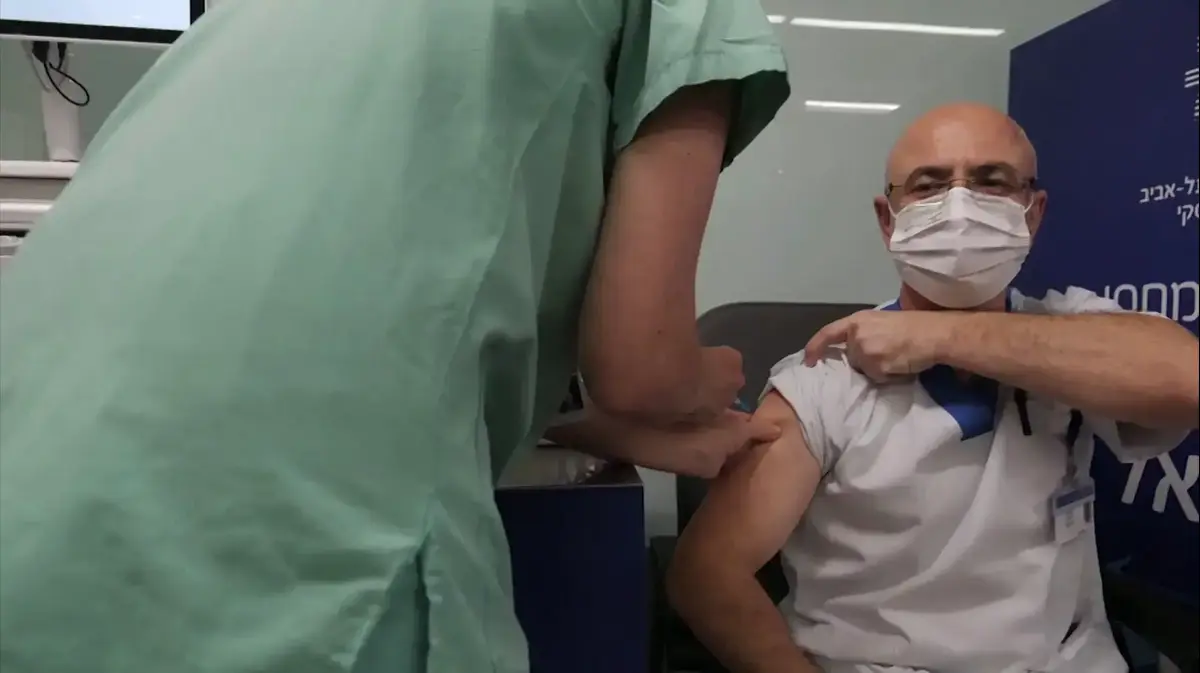Enlarge image
Rapid test center in Hanover
Photo: Julian Stratenschulte / dpa
This article is continuously updated.
Don't miss a thing: subscribe to our
coronavirus newsletter
for the latest developments and the most important background information
.
Scientists: Pandemic assessment based on new clinics
4.30 a.m.:
To assess the pandemic situation, experts bring the number of new intensive care units admissions into play within seven days as an orientation
value
. The incidence, i.e. the number of infections per 100,000 inhabitants within a week, already does not correlate well with the situation, confirmed the epidemiologist Gérard Krause on Tuesday in a video link of the Science Media Center (SMC). The value can both overestimate and underestimate risks.
According to the expert from the Helmholtz Center for Infection Research in Braunschweig, several indicators are needed to properly map the situation and take targeted measures. The Robert Koch Institute (RKI) provides a large amount of data, but unfortunately it is not taken into account in the decision-making process, says Krause. "If you are forced to limit yourself to just one measured value - and that seems to be the case - then the number of new admissions to intensive care units would be what best suits the situation."
Focusing on the seriously ill will be even more important in the future, as the seven-day incidence is increasingly decoupling from the actual health situation, said Krause.
The reason for this are two desirable effects: increasing tests, for example in schools, and vaccinations for risk groups, which will hopefully reduce the health burden.
However, the number of infections will not decrease to the same extent.
This means that the seven-day incidence is "no longer a good point of reference."
more on the subject
Intensive care unit of the Charité: "Stocking up much more will be difficult or impossible" A video by Andreas Evelt and Fabian Pieper
Filmmaker on intensive care unit: "Even when it comes to life and death, everyone is calm" A video by Fabian Pieper and Andreas Evelt
Because a few days pass between infection and the intensive care unit, the incidence is an indicator that shows at an early stage how the situation is developing. From the point of view of Christian Karagiannidis from the scientific management of the Divi Intensive Care Register, the loss of time would be bearable: The advantage of the number of intensive care beds is the greater robustness. One is not dependent on daily fluctuations and delays in reporting or on test frequencies. "We really see what's going on." He spoke out in favor of a joint consideration of this number in connection with prognosis models for the occupancy of the intensive care beds. One should never look at just one value.
In the Divi Intensive Care Register, data on bed occupancy with Covid 19 patients in intensive care units are published. A federal value is shown for new admissions including relocations. Regional data are not yet available, so an estimation model with limit values has been developed depending on the federal state, said Helmut Küchenhoff, head of the statistical consulting laboratory at LMU Munich. According to a report by authors around Küchenhoff and Krause, "any time delay" could be compensated for with low limit values.
However, new admissions are also associated with restrictions, as the scientists themselves write: For example, the length of time a patient is in the intensive care unit is not constant over a long period of time, as it also depends on the age and changed virus properties.
When counting, a distinction must also be made between patients who are admitted due to Covid-19 and those with other diseases but positive Sars-CoV-2 evidence.
The researchers also find information about the place of origin of the patients - instead of the location of the treating intensive care unit - important.
Schäuble defends night curfews as proportionate
03.55 a.m.:
Bundestag President Wolfgang Schäuble (CDU) has defended the planned nocturnal
curfews
in regions with high corona numbers as being proportionate. "A look abroad shows that all countries that have regained control of high numbers of infections have resorted to exit restrictions at times," said Schäuble to the Berlin "Tagesspiegel".
This Wednesday, the Bundestag wants to pass nationwide uniform rules to combat the corona pandemic.
Among other things, exit restrictions from 10 p.m. to 5 a.m. are planned, as can be seen from the draft to amend the Infection Protection Act.
As a result, jogging and walking are allowed until midnight, provided you are alone.
The federal emergency brake should be pulled if more than 100 new infections per 100,000 inhabitants occur in a district or a city within seven days.
Enlarge image
Wolfgang Schäuble
Photo: Frederic Kern / imago images / Future Image
Schäuble rejected criticism of the federal government's rights of enforcement.
"I think that comparisons with Weimar, which individuals employ, are completely wrong," said the CDU politician.
The law is limited in time.
The Federal Government will also need the approval of the Bundestag and Bundesrat for further measures in the future.
There could be no question of self-empowerment.
The law is required in the current situation, said Schäuble.
Italy wants to vaccinate people over 60 with vaccine from Johnson & Johnson
03.45 a.m.:
Italy will primarily give Johnson & Johnson's corona vaccine to people over 60 years of age.
As the Italian health authorities announced on Tuesday, the vaccine is now "definitely" classified as safe after the positive risk assessment by the European Medicines Agency (EMA).
Due to isolated serious side effects in younger people vaccinated, it should mainly be vaccinated in older people and at risk patients.
AstraZeneca's corona vaccine is also only given to people over the age of 60 in Italy.
The EMA announced on Tuesday that it would in principle stick to its positive risk assessment of the corona vaccine from Johnson & Johnson despite reports of blood clots.
There is "a possible connection" between the vaccine and the occasional occurrence of blood clots, the EMA explained.
The benefits of the US company's vaccine outweigh the risks.
more on the subject
Third wave of infections in Germany: The vaccination paradox by Holger Dambeck and Patrick Stotz
For its assessment, the EMA took into account, according to its own information, "all currently available knowledge", especially from the USA.
Accordingly, by April 13, more than seven million US citizens had received the vaccine.
Serious blood clots occurred in eight cases after vaccination, one of which was fatal.
"All cases occurred in people under 60 years of age within three weeks of vaccination, the majority in women," the EMA continues.
Nevertheless, the current data do not allow any reliable knowledge about specific risk factors.
Blood clots should now be listed as a "very rare side effect" of the vaccine.
A week ago, the Johnson & Johnson vaccine had been suspended in the United States.
The vaccine is already approved in Europe but has not yet been administered.
The delivery of the drug has been postponed following the reports of blood clots.
In early April, the EMA issued a similar revised rating for the vaccine from the British-Swedish manufacturer AstraZeneca.
Many countries, including Germany, then continued vaccinations with the drug, but introduced lower age limits.
In Germany, only people over the age of 60 should be vaccinated with AstraZeneca.
Clinics warn of supply shortages for regular patients
02.20 a.m.:
In view of the increasing number of corona patients in intensive care units, the German Hospital Association warns of supply bottlenecks for regular patients.
"If the infection situation does not ease in the next few weeks, many clinics will get to the point where they have to postpone operations not just by a few weeks, but by months," said managing director Gernot Gass to the newspapers of the Funke media group.
90 percent of the clinics are currently postponing more than ten percent of the interventions, 50 percent even more than 20 percent, said Gass.
In the case of individual interventions, for example hip replacement, an average of 40 percent of the operations would be canceled.
"The longer the third wave of pandemics lasts, the more severe the bottlenecks in predictable interventions," warned Gaß.
The German Cancer Society also warned of a worsening situation for cancer patients: "If the infection situation continues to worsen, the waiting times for predictable operations will increase significantly in the coming weeks," its president Thomas Seufferlein told the Funke newspapers.
"I don't want to talk about triage, but many clinics now have to prioritize."
Cancer patients whose condition is medically stable often have to wait two or three weeks longer for their intervention than usual, said Seufferlein.
In the case of some tumor diseases, this can lead to deterioration.
In any case, such a delay would be psychologically stressful for patients who have just been diagnosed with cancer.
The intensive care physicians were also concerned: Already now only ten percent of the intensive care beds are free in many clinics - often only a single bed, said the President of the German Interdisciplinary Association for Intensive and Emergency Medicine (Divi), Gernot Marx, the Funke newspapers .
"If we get well over 6,000 Covid intensive care patients, only crisis medicine is possible in the entire hospital."
Patients with large but plannable heart operations or cancer patients, whose tumor operations would also have to be postponed until further notice, if they are not life-threatening, suffered from this.
Marx warned: If the nationwide corona emergency brake, which the Bundestag wants to pass on Wednesday morning, does not take effect quickly, the emergency beds of all clinics in Germany will be needed in a few weeks.
»Then we would be in disaster mode: We would have to withdraw the staff from the other departments in order to care for Covid patients and other acutely life-threatening patients - but only these.
That means less and worse care for everyone else. "
Real estate industry criticizes unequal treatment in the federal emergency brake
1:55 a.m.:
Before the amended Infection
Protection
Act was passed in the Bundestag, the landlords of commercial properties criticized the draft.
"There is a completely irrational unequal treatment of industries," says Andreas Mattner, President of the Central Real Estate Committee (ZIA), the newspapers of the Funke media group.
For example, grocers are likely to continue selling shoes, clothing or toys, while specialist retailers will have to close.
"Shoes in the supermarket are no more corona-safe than at the specialist retailer." The law, known as the federal emergency brake, is an immense burden on retail and ignores the study situation, there is a threat of a wave of layoffs and desertification of the inner cities.
Denmark "lends" Schleswig-Holstein 55,000 AstraZeneca vaccine doses
0.45 a.m.:
Denmark wants to leave 55,000 doses of the corona vaccine from AstraZeneca to the neighboring German state of Schleswig-Holstein for the time being. The government is responding to a request from Schleswig-Holstein's Prime Minister Daniel Günther (CDU), the Danish Foreign Ministry announced on Tuesday. Denmark was the first country in Europe to permanently discontinue corona vaccinations with the AstraZeneca preparation after reports of blood clots.
The doses of the vaccine would be reimbursed to Denmark "within an agreed timeframe," the ministry added.
Denmark is currently vaccinating with the vaccines from Biontech / Pfizer and Moderna.
According to official information, the AstraZeneca vaccine could also be used again at a later point in time "if the situation changes".
Denmark has a stock of around 200,000 AstraZeneca cans.
Due to the very rare occurrence of blood clots, the AstraZeneca vaccine is only given to certain age groups in many EU countries, and only to people over 60 in Germany.
However, the EU Medicines Agency (EMA) and the World Health Organization (WHO) continue to recommend the vaccine for all age groups and emphasize that the benefits should be rated higher than the risks.
GEW apparently insists on distance learning from an incidence value of 100
0.25 a.m.:
The Education and Science Union (GEW) considers the changes to the Infection Protection Act to be insufficient to protect teachers and students well in the corona pandemic.
"The now planned incidence value of 165, from which schools should switch to distance learning, is still too high," says GEW boss Marlis Tepe to the editorial network Germany according to the preliminary report.
"Teachers, schoolchildren and their parents are exposed to risks that politics in other parts of society do not consider acceptable." The GEW therefore continues to advocate that schools with a value of 100 or more switch to distance learning and daycare centers are closed .
cop / AFP / dpa / Reuters














